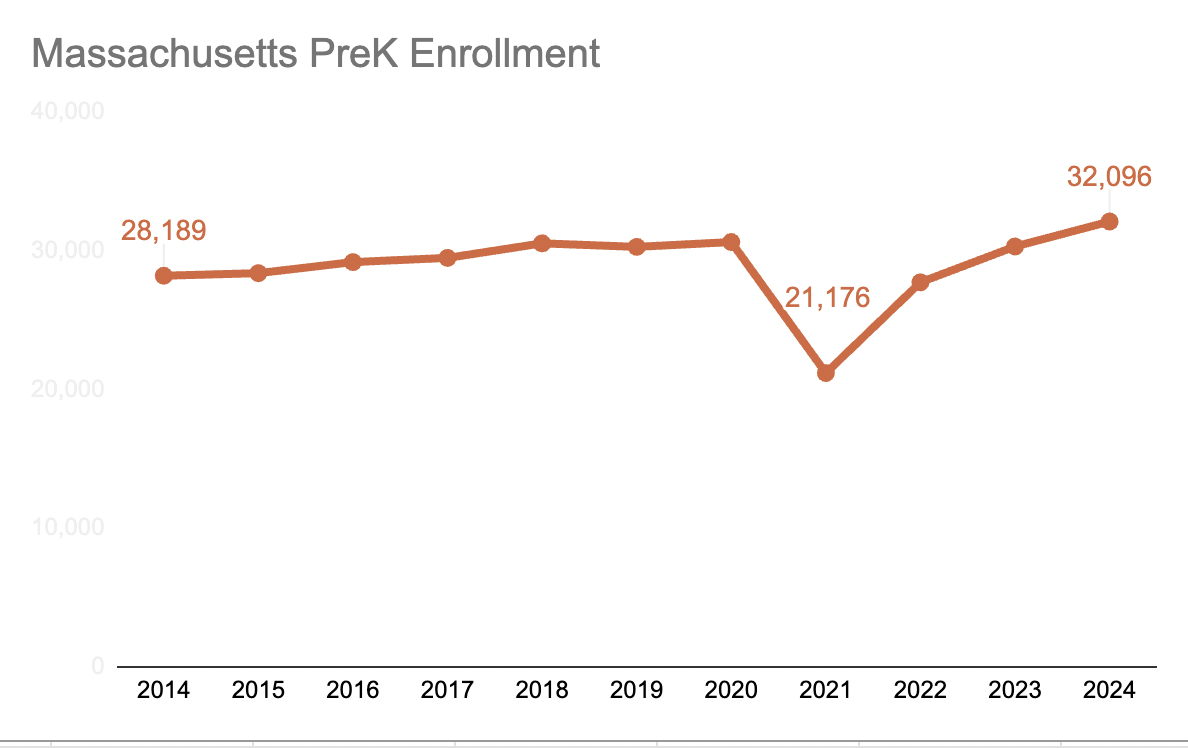FYI from BSF, 3.1.24
Massachusetts just released more detailed enrollment data for 2024.
Some of the most dramatic shifts over the past decade are present in our lowest grades.
PreK represents the greatest increase. Massachusetts (+12.2%) and Boston (+13.4%) saw similar growth in PreK. Boston’s overall PreK enrollment is significantly higher than this figure due to charters, parochial schools, and private providers (page 19) , many of whom are coordinated through UPK.
The Commonwealth and its capital both experienced significant enrollment shocks in 2021, with recovery of enrollment to follow. Massachusetts is actually past its pre-pandemic PreK enrollment.
The biggest decrease in enrollment is in the very next grade, kindergarten. Both Massachusetts and Boston posted long-term pre-pandemic decreases that accelerated in 2021. Rather than a return to pre-pandemic levels (like PreK), kindergarten enrollment appears to have flattened at new, lower levels (Massachusetts, -13%; Boston, -25%).
If there are more 4-year olds in schools, shouldn’t there be more 5-year olds in schools?
Yes, except there aren’t actually more young kids.
There are just more kids starting school sooner (which is good!).
This is important because although the expansion of PreK and early childhood education draws attention, kindergarten drives enrollment and long-term budgets. Smaller kindergarten cohorts means smaller districts over time, and smaller districts means less state and federal funding and less opportunities for efficiencies.
In the 30+ years since the Education Reform Act, Massachusetts and its school districts have never experienced declining enrollment in a time of softer state revenues and sunsetting federal dollars.
This is "new math."
notes in the margin
Boston School Committee met on Wednesday, but the big agenda item was out before it began. The O’Bryant will not move to a renovated campus at the West Roxbury Educational Complex, leaving some questions about what is next. Remaining materials here, including discussion of another facilities project, the BCLA-McCormack, that has also met community resistance in the past.
Over February break, a lawsuit was filed to stop the renovation of White Stadium, another Green New Deal for Boston Schools project.
The Boston Teachers Union has opened contract negotiations - this is what they are proposing.
The first Harm Report from Embrace Boston includes a section on education (starts on page 61).
The Board of Elementary and Secondary Education met on Tuesday, officially naming Russell Johnston as acting commissioner. Full materials here.
Massachusetts leads the country in Advanced Placement tests, even closing racial achievement gaps. But even the Commonwealth can’t buck the nationwide trend that saw student achievement increase until about a decade ago, with declines to follow (and hasten with pandemic).
Bills to reform vocational school admissions and to give the state more authority over literacy curriculum are garnering attention at the State House.
The Supreme Court chose not to take up a case regarding admissions at Thomas Jefferson, a magnet school in Virginia. This has implications around the country, particularly in cities like Boston that have exam schools.
The FAFSA is generating healthcare.gov PTSD.







